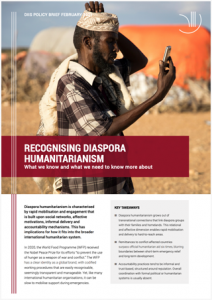This briefing is an output of the Diaspora Humanitarianism in Complex Crises (D-Hum) project, a partnership between the Danish Institute for International Studies, Institute for Development Studies, University of Nairobi, Rako Research and Communication Centre, and the Rift Valley Institute.
Key Takeaways
• Diaspora humanitarianism grows out of transnational connections that link diaspora groups with their families and homelands. This relational and affective dimension enables rapid mobilisation and delivery to hard-to-reach areas.
• Remittances to conflict-affected countries surpass official humanitarian aid six times, blurring boundaries between short-term emergency relief and long-term development.
• Accountability practices tend to be informal and trust-based, structured around reputation. Overall coordination with formal political or humanitarian systems is usually absent.
The briefing was written by Mohamed Aden Hassan, Sahra Ahmed Koshin, Peter Albrecht, Mark Bradbury (RVI), Fatima Dahir Mohamed, Abdirahman Edle Ali, Karuti Kanyinga, Nauja Kleist, George Michuki, Ahmed Musa, Jethro Norman and Obadia Okinda, and was originally published by D-Hum.




